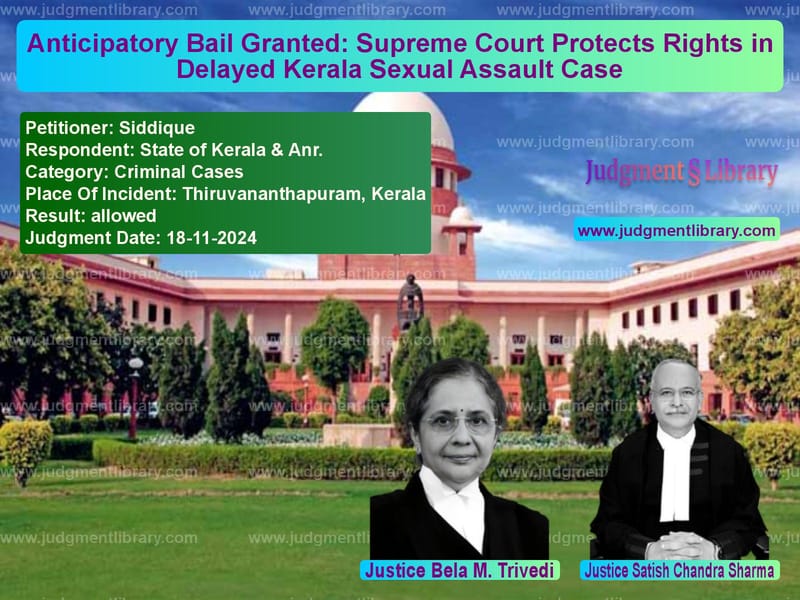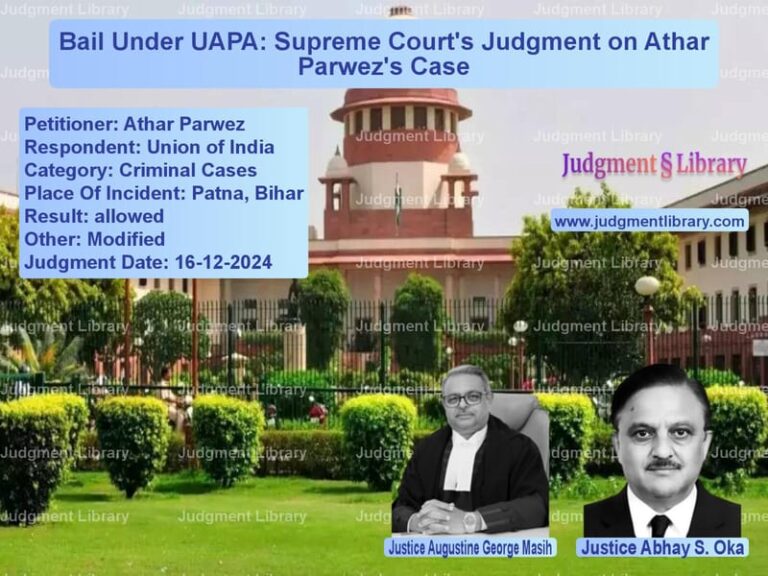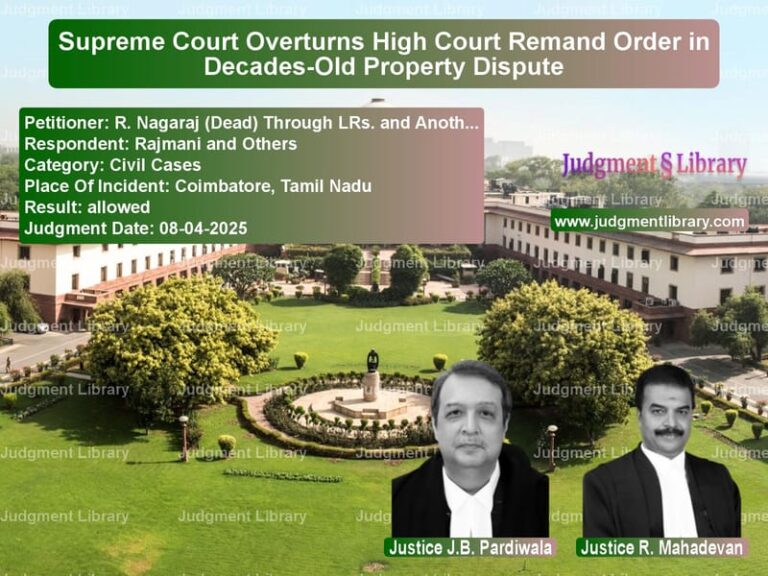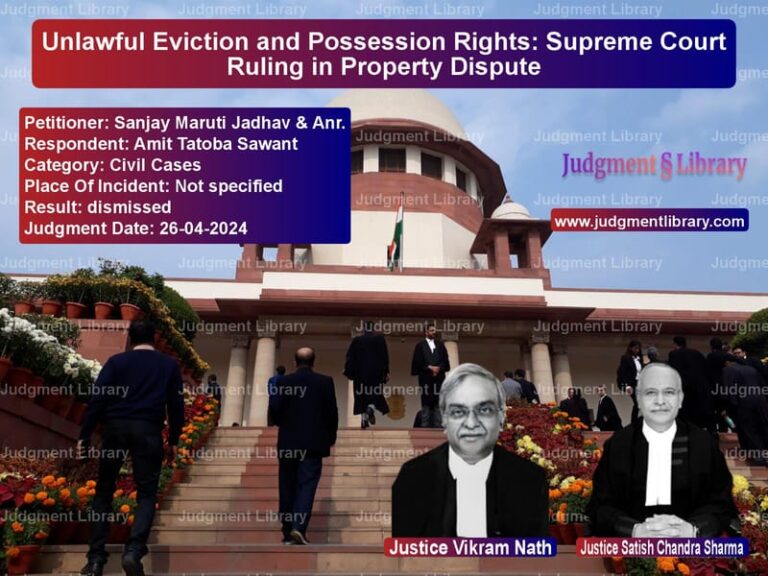Anticipatory Bail Granted: Supreme Court Protects Rights in Delayed Kerala Sexual Assault Case
The Supreme Court of India has granted anticipatory bail to Siddique, accused of sexual assault in a case that emerged nearly eight years after the alleged incident. The judgment, delivered in Siddique vs. State of Kerala & Anr., highlights critical considerations in delayed complaints and the principles governing pre-trial detention.
Background of the Case
The case stems from an FIR (Crime No. 1192 of 2024) registered at Museum Police Station, Thiruvananthapuram, Kerala. The complaint was filed under Sections 376 (rape) and 506 (criminal intimidation) of the Indian Penal Code (IPC).
Timeline of Events
- 2016: The alleged incident of sexual assault took place.
- 2018: The complainant posted on Facebook, naming 14 individuals, including the appellant, in connection with allegations of sexual abuse.
- 2024 (August 27): The complainant formally lodged the FIR.
- 2024 (September 24): The Kerala High Court rejected the appellant’s anticipatory bail plea.
- 2024 (November 19): The Supreme Court granted anticipatory bail.
Arguments by the Parties
Appellant’s Arguments
Senior Counsel representing Siddique argued:
- The complaint was filed eight years after the alleged incident, raising concerns about evidence reliability.
- The complainant had previously posted on Facebook in 2018, naming multiple individuals, suggesting motivation beyond personal justice.
- She did not approach the Justice Hema Committee, which was set up by the Kerala High Court to investigate cases of sexual harassment.
- Pre-trial incarceration was unnecessary as the appellant was willing to cooperate with the investigation.
State’s Arguments
The prosecution countered:
- The delay in reporting should not be grounds for bail as survivors often take time to come forward.
- Considering the gravity of the allegations, custodial interrogation was necessary.
- The accused might influence witnesses if released.
Supreme Court’s Observations
The Court carefully considered the facts and legal precedents before granting relief. Key observations included:
1. Delayed Reporting and Its Impact
- The eight-year delay in filing the FIR raised concerns about the veracity of the allegations.
- The complainant’s social media post in 2018, naming multiple people, indicated that the matter had been raised earlier but not formally pursued.
2. Justice Hema Committee
- The complainant did not approach the committee set up by the Kerala High Court for sexual harassment grievances.
- This indicated that the case had not been pursued through available legal avenues.
3. Balancing Victim’s Rights and Accused’s Liberty
- The Court acknowledged the seriousness of sexual assault allegations but emphasized that pre-trial detention should not be used as punishment.
- Since the appellant had no history of non-cooperation, there was no justification for denying him bail.
Supreme Court’s Judgment
The Supreme Court granted anticipatory bail with the following conditions:
- If arrested, the appellant must be released on bail immediately.
- The appellant must deposit his passport with the trial court.
- He must fully cooperate with the investigating officer.
- Failure to comply with bail conditions would result in cancellation of bail.
Key Excerpts from the Judgment
“Considering the fact that the complainant had lodged the complaint almost eight years after the alleged incident, and had also posted on Facebook in 2018 naming multiple individuals, we are inclined to accept the appeal, subject to certain conditions.”
Read also: https://judgmentlibrary.com/supreme-court-modifies-sentence-in-sexual-assault-case-after-25-years/
“It is directed that in the event of arrest, the appellant shall be released on bail, subject to conditions imposed by the trial court.”
Legal Implications of the Judgment
1. Significance of Delayed Complaints
The ruling highlights that while survivors may take time to come forward, unexplained delays weaken cases and warrant careful judicial scrutiny.
2. Social Media Allegations and Legal Proceedings
The judgment suggests that public allegations do not equate to legal action and that complaints must be pursued through formal mechanisms.
3. Guidelines for Anticipatory Bail in Sexual Assault Cases
The decision reaffirms that anticipatory bail can be granted even in serious cases if:
- There is a long delay in filing the complaint.
- The accused has no criminal history or record of non-cooperation.
- The prosecution’s case has evidentiary gaps.
Conclusion
The Supreme Court’s ruling in Siddique vs. State of Kerala underscores the importance of balancing justice for survivors with the protection of the accused’s rights. By granting anticipatory bail, the Court ensured that an individual is not subjected to pre-trial punishment in the absence of strong evidence. The case sets an important precedent in handling delayed sexual assault complaints and reinforces due process principles in criminal justice.
Petitioner Name: Siddique.Respondent Name: State of Kerala & Anr..Judgment By: Justice Bela M. Trivedi, Justice Satish Chandra Sharma.Place Of Incident: Thiruvananthapuram, Kerala.Judgment Date: 18-11-2024.
Don’t miss out on the full details! Download the complete judgment in PDF format below and gain valuable insights instantly!
Download Judgment: siddique-vs-state-of-kerala-&-an-supreme-court-of-india-judgment-dated-18-11-2024.pdf
Directly Download Judgment: Directly download this Judgment
See all petitions in Bail and Anticipatory Bail
See all petitions in Public Sector Employees
See all petitions in Fraud and Forgery
See all petitions in Judgment by Bela M. Trivedi
See all petitions in Judgment by Satish Chandra Sharma
See all petitions in allowed
See all petitions in supreme court of India judgments November 2024
See all petitions in 2024 judgments
See all posts in Criminal Cases Category
See all allowed petitions in Criminal Cases Category
See all Dismissed petitions in Criminal Cases Category
See all partially allowed petitions in Criminal Cases Category







